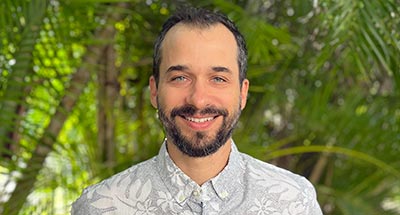
Santiago Papini
Assistant Professor
Office: Sakamaki D411
Telephone: 1 (808) 956-3644
Email: spapini@hawaii.edu
Browse My Publications:
Background
My initial career was in education, teaching calculus and statistics at a high school in Brooklyn, New York. As my interests shifted to the mental health of my students, I pursued a Master’s in counseling but it wasn’t until I started working on clinical trials for PTSD and substance use that I realized I wanted to be a clinical scientist. This has led to diverse training experiences in academic, veteran, and civilian healthcare systems. I am passionate about research and clinical work that takes into account the rich and diverse complexity of individuals. As a teacher and mentor, I aim to stimulate students’ natural curiosity and impart tangible skills relevant to their goals. My philosophy recognizes that education opens doors to diverse careers, and I prepare students to become leaders in the field they choose to pursue.
Education
- NIMH T32 Research Fellow, Clinical Informatics, Kaiser Permanente Northern California, 2023
- UC President’s Postdoctoral Fellow, Predictive Modeling and Psychiatric Genetics, University of California San Diego, 2021
- PhD, Clinical Psychology, The University of Texas at Austin, 2021
- MA, Mental Health Counseling, City College of New York, 2013
- MS, Secondary Mathematics Education, Pace University, 2008
- BA, Philosophy, The University of Texas at Austin, 2006
Courses
- PSY 212: Research Methods
- PSY 675: Treatment Research
Research
My deep interest in the complex presentation and course of psychopathology arose from clinical work with populations disproportionately impacted by trauma. Psychiatric comorbidity is the norm, and symptom profiles are highly heterogeneous. This underlies the challenge of answering: What mechanisms should treatments target? How can we target interventions to the specific needs of individuals? The Targeted Interventions Lab seeks to address these challenges by developing targeted prevention and intervention strategies for mental health outcomes, including addiction, anxiety, and stress-related psychopathology. The lab's current research priorities include:
- Predictive modeling to facilitate targeted intervention strategies
- Development of interventions that target transdiagnostic mechanisms
- Integrating genomic data to estimate risk for adverse psychiatric outcomes
- Rigorous methods for causal inference



